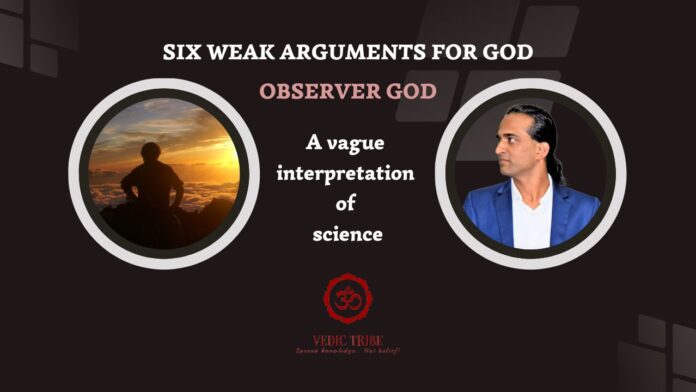Who is an Observer?
In the previous article we discussed we discussed how “logic & reasoning” are not the ultimate source of true knowledge. In this article we will discuss the first weak argument for God – i.e., “Observer God”.
Sankhya: The observer is “Purusha,” the pure consciousness that witnesses the play of nature (Prakriti).
Yoga: Patanjali identifies God as “Vishesha-purusha,” the supreme observer.
Vedanta: “Parabrahma” is the independent reality, often described as the supreme conscious observer.
In Western Philosophy: The concept aligns with the “mind-body problem” and the debate between materialism (matter is primary) and idealism (consciousness is primary).
In Quantum Physics:
The Measurement Problem: At the subatomic level, particles exist as wave functions (probabilities) until “measured.” This measurement causes the wave function to “collapse” into a particle. The quantum measurement problem seemingly requires an observer for the universe to function. This aligns with the idea of a divine consciousness that underlies reality.
The Observer’s Role: Theistic interpretation argues that this “measurement” requires a conscious observer, often interpreted as God.
Neo Vedanta: This idea is often borrowed by contemporary neo-Vedanta proponents and it is argued that Advaita Vedanta established this thought process earlier.
Criticism on the role of observer:
Measurement: The concept of “measurement” in quantum physics is often misinterpreted. “Measurement” can be simply the interaction between particles, not necessarily requiring a conscious observer.
Panpsychism., a non-theistic view: It proposes that consciousness is inherent in all matter, eliminating the need for a separate, supreme observer. Hence, it offers an alternative explanation without requiring a supreme observer.
The weak argument: The theistic arguments heavily rely on a specific interpretation of quantum mechanics, which is still an area of active research. Hence, it is considered a weak argument for God.
Vedic Perspective:
Vedic tradition emphasizes inner exploration and subjective experience rather than external observation and hence scientific discoveries do not play any role except for creating awe & wonder.
For Sadhaka the scientific discoveries re-establish the traditional view of appreciating almighty’s role in the workings of cosmos. This is simply supplementary to Jnana, Bhakti and Vairagya – the tenets of liberation in Vedanta.
Jnana: Knowledge (Jnana) of material world is an access point to the knowledge of the supreme
Bhakti: This knowledge of material world and the awe & wonder in it leads to the devotion (Bhakti) for the supreme
Vairagya: Both Jnana & Bhakti helps us detach (Vairagya) from the impermanent & fluctuating material reality.
Key Points for Sadhaka:
– The concept of “Observer God” is a complex one with roots in scientific domainand should not be loosely used for spiritual interpretations.
– Instead, Sadhaka should focus on introspection, internal enquiry, meditation and adopt Vedantic tenets such as Jnana-Bhakti-Vairagya to progress in spiritual realm.
In our next article, we will discuss a weak argument for God: “God of gaps”
Madhwesh K
Vedic Tribe

